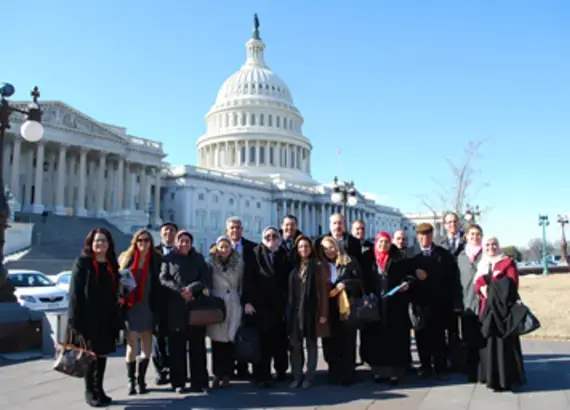
Success Story
Middle East Parliamentarians Discuss Legislating, Budgeting and Women’s Political Participation in Washington, Richmond Visits
Seventeen members of parliament from Jordan, Libya, Morocco and Tunisia visited the U.S. last week as part of a parliamentary exchange program to study legislative operations, including committee work, the appropriations process and congressional oversight.
The nine-day exchange, hosted by NDI in cooperation with the Institute for Representative Government, brought the MPs to Washington, DC, and Richmond, VA.
In Washington, the MPs met with a bipartisan group of members of Congress, including the current chairs of the House Democracy Partnership, a bipartisan commission that works with partner countries around the world to strengthen legislative institutions; senior congressional staff; representatives from congressional support agencies; members of the National Security Council; and State Department representatives to discuss issues in the region and the bilateral relationships of the U.S. and their respective countries.
A majority of the delegation members were women, and women’s political participation was an important focus throughout the program.
Four of the visitors took part in a public event at NDI, “Women in the New Arab Politics,” moderated by Tamara Cofman Wittes,director of the Saban Center for Middle East Policy at the Brookings Institution. The panelists discussed the importance of gender equality measures in constitutions, laws and regulations to support women’s participation in the electoral process, including different types of quotas.
 Hon. Fatiha Mouknii of Morocco speaks with moderator Tamara Cofman Wittes during the “Women in the New Arab Politics” panel.
Hon. Fatiha Mouknii of Morocco speaks with moderator Tamara Cofman Wittes during the “Women in the New Arab Politics” panel. The group also met with women legislators in Washington and Richmond, and exchanged perspectives with Melanne Verveer, former ambassador at large for global women’s issues who is executive director of Georgetown University’s Institute for Women, Peace, and Security.
In Richmond, the delegation met with Governor Terry McAuliffe; Maurice Jones, Virginia secretary of commerce and trade; and a bipartisan group of leaders from both chambers of the state legislature.
As the Virginia legislature worked to close out its session, the MPs observed the proceedings from the visitors’ gallery and were recognized by the Virginia Senate. The delegation was then treated to an impromptu briefing in Arabic on the Senate’s page program by a page of Lebanese descent. Several delegation members commented on the potential benefits in their own countries of creating similar opportunities for young people to engage in political life.
The group also made a brief visit to Colonial Williamsburg for a series of discussions on civic education. Colin Campbell, chief executive officer of the Colonial Williamsburg Foundation, discussed the importance of preserving historic sites as a way of fostering a shared national identity to deepen citizen engagement.
The program was funded by the State Department’s Bureau of Educational and Cultural Affairs, with additional support from the United States Agency for International Development (USAID).
Read more:
Published March 7, 2014



